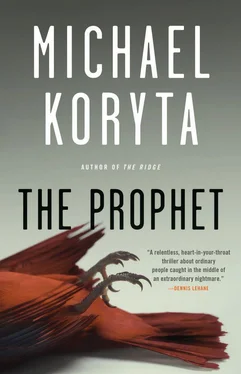“Have you interviewed him?”
Dean tapped his pencil, eyes down, and shook his head.
“Why not?”
“Because he’s missing.”
“Missing?”
“He’s made none of the required contact. There’s an active warrant for parole violation.”
Kent closed his eyes. “When was he paroled?”
“In August.”
“When the letters resumed with Rachel. The false letters.”
“Yes.”
Kent rubbed a hand over his face and said, “He was in for assault, wasn’t he?”
“How do you know that?”
“I asked the director of our outreach program to find out for me. His name is Dan Grissom. He said it was assault. Is that correct?”
“It is. Sexual assault, stalking, violating a restraining order. Why are you so sure he wrote this letter?”
“Because it’s a repeat conversation.”
“Pardon?”
“I’ve done a lot of prison visits,” Kent said. “There are men who listen, and men who don’t. Men who mock, men who get on their knees and pray with you. I’ve seen them all by now. Or I thought I had. I’d never seen anything quite like him, though. He was… combative, I guess that would be the word. But not in an angry way. The best way I can describe it is… intensely interested.”
Focused attention was the phrase that first came to mind, but that was his coaching mantra, and he could not transfer it to Clayton Sipes, refused to do so.
“Interested in your message?” Dean said.
“Interested in challenging my message. Interested in challenging the very idea that I believed in a God, but he wasn’t content to keep that debate theological.”
“Explain that.”
“It was personal,” Kent said. “Immediately. When I go to a prison, I tell a personal story, of course. I talk about my sister, the way I had to learn to bear that grief. I talk about my own journey. But his reaction…” Kent paused and shook his head, remembering the man so vividly, shaved head, wiry muscle, neck and left arm covered in brightly colored tattoos. “His reaction was disturbing. It was as if… as if I woke something up in him. He was all dull eyes and boredom and then he just kept… intensifying. I don’t know the best way to describe it. The way his interest grew as I talked was unsettling. Like it was this dim light when I walked in the room and with every detail I shared it got brighter and brighter, right? Not in a healthy way.”
“You simply observed this? Or was there direct interaction?”
“Oh, there was direct interaction. He asked to speak with me alone when my talk was done. What he wanted from that conversation was specific. It was very important for him to hear me say that my faith couldn’t be broken.”
“But you didn’t think he was taking reassurance from that?”
“No. I thought he was taking a challenge from it. I know that he was.”
“Did you mention Rachel Bond?”
“No. I’d never have done that. She was a child.”
Dean frowned. “The letter seems to indicate otherwise.”
“Well, I mean, I didn’t use her name. I didn’t identify her.”
“But you discussed the situation?”
“To an extent.”
“What extent?”
“Minimal.” Kent realized how defensive he was becoming, realized that he was acting as if he were being accused of a crime, and for the first time understood exactly why. He felt guilty. What Dean was asking about wasn’t speculation, it was the truth. Clayton Sipes had found his way to Rachel Bond through Kent.
“I’m going to need a little more than—”
“I was talking about forgiveness,” Kent said. “And family. Those are regular points for me. Usually I keep it focused on my own experience. But this summer, the situation with Rachel and her father was fresh. She’d been so relieved to make contact. She’d replaced something that was missing, you know? So I used her”—he stuttered then, hating the word choice, used —“as a, uh, an anecdote. A lot of those men have lost ties with family. Maybe through their choice, maybe not. Many of them have isolated themselves from family because of guilt and shame. I wanted to talk about that, and… her situation was fresh. It was relevant.”
Dean scribbled on his pad and said, “The two cards, the football card and the business card. Why would he have sent those?”
“To make me suffer. He was fascinated by the idea that I said I’d found peace with my sister’s murder. He took issue with that.”
“You don’t believe it was designed to make you feel doubt?”
Kent paused. “Doubt in what?”
“Gideon Pearce’s guilt.”
The silence built and hung. Kent swallowed, leaned forward, and said, “I feel no doubt about the guilt of Gideon Pearce.”
“I didn’t ask what you felt. I asked if it was possible that’s what he was going for.”
“Perhaps.” The twenty-two-year-old football card was already haunting him, because it had come from one of two places: the evidence collection from Gideon Pearce’s case, or the inside of Kent’s childhood home. They’d printed a few thousand of those cards in 1989, but there were only two in the world with the number 18 inked on the back in his dead sister’s handwriting. It was Kent’s number. There had been no football card for him in 1989 because he was not all-state, was not even a starter, but she hadn’t wanted him to feel left out, so she kept two of Adam’s cards and wrote Kent’s number on both. One had been in her room when she went missing. The second had been found with Gideon Pearce after she was murdered.
“So the recollections in the letter,” Dean said, “they’re accurate? This doesn’t strike you as a possible imitation?”
“Absolutely not. They’re accurate. I talk about forgiveness, faith, all of the things that were mentioned in the letter. About Gideon Pearce. I invite them to contact me if I can help.”
“What about your brother?”
“Pardon?”
“Do you talk about him during these visits? The cards are directly connected to him.”
“I don’t know if I used his name. I talked about what my family went through. And the card, I talked about that. The way it felt when we learned about Pearce.”
“Are you aware of any people you might consider enemies of your brother? Deep-seated problems, threats, things of that nature?”
“I don’t know what that has to do with Clayton Sipes.”
“Probably nothing. But we can’t just shut off all other possibilities. Clayton Sipes can be considered a suspect, but right now all we’ve got is your recollection of an odd conversation. So let’s look wider, please. Are you aware of anyone who has problems with your brother?”
“No. I’m sure in his business there have been some.”
“Why do you say that?”
“He brings people back to jail. I would imagine many of them resent that.”
“True. But that’s not a personal thing, is it?”
“No. I’m just saying… listen, I am not qualified to talk about my brother’s life.”
“You’re not close, I take it.”
“No.”
“Why not?”
Kent felt his jaw clench. “Personal differences.”
“Any particular incident? Something to do with Gideon Pearce?”
The sound of the name put a chill through Kent. Always had, always would.
“Gideon Pearce is dead.”
“I understand that.”
“Then why would you ask—”
“Someone gave you a football card identical to the one found in his possession after your sister was murdered. He seems relevant.”
“Okay. All right. Yeah, it had to do with Pearce. I went to see him, in prison, long after he had been convicted. My brother didn’t approve. He came by my house to express that, and… we got into it pretty good.”
Читать дальше












